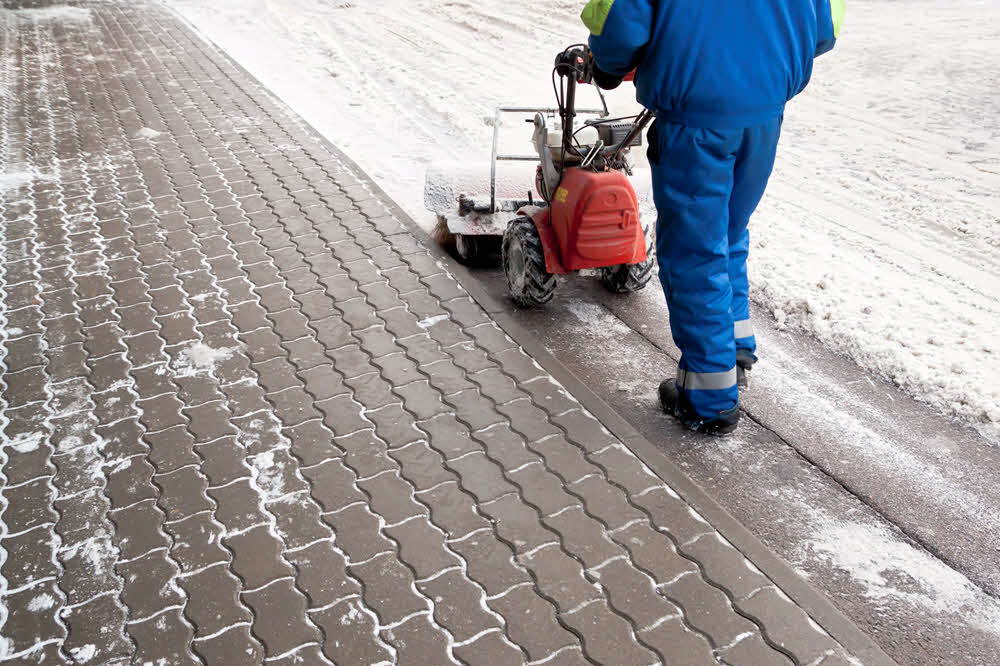Snow Clearingin Eastpointe MI
Keeping Your Property Safewith Professional Snow Clearing
We Are Locally Owned & Operated For Over 37 Years
Contact Us Today!
We Serve Businesses In And Around The Following Cities:
About Snow Clearing
Introduction
Winter – the time when snow blankets everything and provides picturesque scenes, is both a spectacle and a menace. For commercial properties in Eastpointe, snow clearing is not just a routine task, but a necessity that forms an integral part of maintaining their facilities during the winter months. Effective snow clearing ensures the safety and easy movement of people who frequent these properties. This article delves into all aspects of snow clearing in Eastpointe, exploring the steps involved, the benefits, and offering practical examples from the real-world applications of thorough commercial snow clearing.
Understanding Snow Clearing for Commercial Properties
The task of snow clearing for business premises may seem straightforward, but the reality is far different. It involves a series of steps, taken in carefully arranged order, particularly for large commercial properties. The process starts with monitoring weather forecasts to anticipate snowfall. Once snow hits, initial clearing begins, focusing on the most frequently used areas. Regular clearing is done periodically throughout the storm duration. After the snow stops, a final round of clearing is carried out, removing any remaining snow and treating the areas with de-icers to prevent an icy buildup. Overall, effective snow clearing requires a blend of practical knowledge, proper tactics, and the right use of equipment.
Benefits of Thorough Commercial Snow Clearing
Thorough snow clearing has numerous advantages for commercial properties. A well-cleared property reduces the risk of slips, falls, and vehicle accidents, fostering a safe environment for both employees and visitors. Further, it prevents potential legal issues due to injuries on the premises. In addition to safety, a meticulously cleared property depicts the management’s commitment to maintaing their facilities, which can boost a business’s image. Further, quick snow clearing services can minimize the closure hours due to heavy snowfall, ensuring that the operations stay uninterrupted.
The Real-World Applications and Impact
D&J Contracting is a well-known company that provides snow clearing services for commercial properties in Eastpointe. Their work presents practical, real-world examples of the importance of efficient snow clearing. For instance, a shopping mall they serviced avoided closure during a significant snowfall, thanks to their quick and thorough snow-clearing tactics. Similarly, a hospital in Eastpointe, during one winter session, remained accessible due to dedicated snow clearing, ensuring that vital services were unaffected. The examples clearly highlight the impact and the critical nature of efficient snow clearing for commercial properties.
Snow Clearing Services – The Right Choice for Commercial Properties
For commercial properties, employing professional snow clearing services like D&J Contracting can prove to be a strategic asset. Handling snow clearing in-house can be challenging for businesses due to the need for specialized equipment and training. Outsourcing this task ensures that the work is done swiftly, reducing the risk and liability. Further, it allows the organization to focus on its core functions, while leaving the job of snow clearing to the experts.
Moreover, services like D&J Contracting not only ensure quick snow clearing services, but also guarantee a thorough job. Their trained staff, with their comprehensive clearing strategies, ensure that every corner of your commercial property is cleared and safe for use. Their services act as a safeguard, keeping your business fully operational even during the toughest winters.
The bottom line is, when it comes to snow clearing for business premises in Eastpointe – a city well-known for its heavy snowfalls – the case for professional snow clearing services becomes compelling. D&J Contracting is such a service that values your business, prioritizing safety, and uninterrupted operations.
The Final Reflection
Snow clearing is a crucial task for commercial properties in Eastpointe that can greatly impact their operations during the winter months. It’s not just about clearing the white fluff from the premises; it’s about maintaining safety, upholding the business image, and, above all, ensuring seamless operations. With the support of professional services like D&J Contracting, businesses can meet the challenges posed by heavy snowfalls. They can ensure that their commercial properties are well-maintained, safe, and ready to serve their customers, regardless of the weather. Thus, investing in a professional snow clearing service is not just a wise choice, but it could be an instrumental decision for businesses in Eastpointe.
Snow Clearing Gallery


Call Us Today to receive your Free Quote for
Snow Clearing in Eastpointe
Serving: Eastpointe, Michigan

About Eastpointe, Michigan
|
|
This section does not cite any sources. (June 2023)
|
The community was first settled by Irish and German immigrants in the 1830s. In October 1897, a post office was established there with the name of “Half-way”, as it was near the halfway point of the stage run between downtown Detroit and the Macomb County seat at Mount Clemens. It incorporated as the village of Halfway in December 1924 and reincorporated as the city of East Detroit in January 1929. Prior to 1924, most of the community formed a part of Erin Township (which includes all or part of Eastpointe, Roseville, and St. Clair Shores. The city changed its name to “Eastpointe” after the change was approved by residents in a 1992 referendum; the name change had been proposed to remove any perceived association with the adjacent city of Detroit; the “pointe” suffix is intended to associate the city instead with the nearby affluent communities of the Grosse Pointes. The city also changed its name to give the community a sense that it was its own city with its own unique history, identity, and not an extension or branch of Detroit. Other names were also nominated for the referendum never balloted.
The city’s school district was unaffected by the municipal name change, and was called East Detroit Public Schools until 2017, when it changed the district name to Eastpointe Community Schools to align with the community name. It has one high school (Eastpointe High School), one middle school (Eastpointe Middle School, formerly Kelly Middle School), and four elementary schools. The primary district boundaries of Eastpointe Community Schools encompass the City of Eastpointe, minus the northeastern portion (east of Kelly Rd. and north of Stephens) and the southeastern portion of the city of Warren.
Eastpointe is in southern Macomb County, 10 miles (16 km) northeast of Downtown Detroit and 7 miles (11 km) north of Grosse Pointe. It is bordered to the west by the city of Warren, to the north by Roseville, and to the east by St. Clair Shores. It is bordered to the south by the cities of Detroit and Harper Woods in Wayne County. Roads that follow the city borders include Beechwood Avenue (up until it reaches Stephens Road, where it switches over to Hayes) on its western border (properties on both sides of these streets are within the city limits), 8 Mile/M-102 on its southern border, Beaconsfield/the southern and western bound section of the I-94 service drive on its eastern border, and 10 Mile Road on its northern border except for portions of the blocks of Macomb St. west to Hayes.
According to the United States Census Bureau, the city has a total area of 5.16 square miles (13.36 km), of which 0.002 square miles (0.005 km), or 0.04%, are water.
Eastpointe is generally considered to be a bedroom community. It is a relatively short drive from many other points of interest in the Detroit area. It is served by Interstate 94 (I-94) and I-696, as well as M-he in 3 (Gratiot Avenue), M-102 (8 Mile Road), and 9 Mile Road.
| Census | Pop. | Note | %± |
|---|---|---|---|
| 1930 | 5,955 | — | |
| 1940 | 8,584 | 44.1% | |
| 1950 | 21,461 | 150.0% | |
| 1960 | 45,756 | 113.2% | |
| 1970 | 45,920 | 0.4% | |
| 1980 | 38,280 | −16.6% | |
| 1990 | 35,283 | −7.8% | |
| 2000 | 34,077 | −3.4% | |
| 2010 | 32,442 | −4.8% | |
| 2020 | 34,318 | 5.8% | |
| 2022 (est.) | 33,806 | −1.5% | |
| U.S. Decennial Census 2020 Census |
|||
As of the 2020 census, there were 34,318 people, 13,126 households, and 8,523 families residing in the city. The population density was 6,653.4 inhabitants per square mile (2,568.9/km). There were 13,798 housing units.
As of the 2010 census, there were 32,442 people, 12,557 households, and 8,220 families residing in the city. The population density was 6,307.4 inhabitants per square mile (2,435.3/km). There were 13,796 housing units at an average density of 2,684.0 per square mile (1,036.3/km). The racial makeup of the city was 65.6% White, 29.5% African American, 0.4% Native American, 1.1% Asian, 0.5% from other races, and 2.9% from two or more races. Hispanic or Latino residents of any race were 2.1% of the population.
There were 12,557 households, of which 34.9% had children under the age of 18 living with them, 39.9% were married couples living together, 19.5% had a female householder with no husband present, 6.0% had a male householder with no wife present, and 34.5% were non-families. 28.7% of all households were made up of individuals, and 10.7% had someone living alone who was 65 years of age or older. The average household size was 2.58 and the average family size was 3.19.
The median age in the city was 36.3 years. 25.7% of residents were under the age of 18; 8.8% were between the ages of 18 and 24; 28.6% were from 25 to 44; 25.7% were from 45 to 64; and 11.3% were 65 years of age or older. The gender makeup of the city was 48.4% male and 51.6% female.
As of the 2000 census, there were 34,077 people, 13,595 households, and 8,959 families residing in the city. The population density was 6,678.8 inhabitants per square mile (2,578.7/km). There were 13,965 housing units at an average density of 2,737.0 per square mile (1,056.8/km). The racial makeup of the city was 92.13% White, 4.70% African-American, 0.42% Native American, 0.87% Asian, 0.01% Pacific Islander, 0.27% from other races, and 1.61% from two or more races. Hispanic or Latino residents of any race were 1.33% of the population.
There were 13,595 households, out of which 30.2% had children under the age of 18 living with them, 48.6% were married couples living together, 12.3% had a female householder with no husband present, and 34.1% were non-families. 28.8% of all households were made up of individuals, and 13.8% had someone living alone who was 65 years of age or older. The average household size was 2.50 and the average family size was 3.11.
In the city, 24.5% of the population was under the age of 18, 7.6% was from 18 to 24, 32.3% from 25 to 44, 19.2% from 45 to 64, and 16.5% was 65 years of age or older. The median age was 37 years. For every 100 females, there were 94.3 males. For every 100 females age 18 and over, there were 90.9 males.
The median income for a household in the city was $46,261, and the median income for a family was $54,895. Males had a median income of $41,449 versus $28,095 for females. The per capita income for the city was $20,665. About 4.2% of families and 6.4% of the population were below the poverty line, including 8.5% of those under age 18 and 7.8% of those age 65 or over.
Eastpointe is a Michigan home-rule city and operates under the council-manager form of government. The city’s mayor and four council members are elected at large to four-year staggered terms.
In 2017, Eastpointe elected its first African-American councilwoman, Monique Owens. In 2019, Suzanne Pixley, who had been mayor since 2007, did not seek reelection after her third four-year term. Councilwoman Monique Owens succeeded Pixley as mayor in 2019, becoming the first African-American mayor of Eastpointe and also making the city the first in the county to elect an African-American as mayor.
Owens was unseated in the 2023 mayoral primary. Her tenure as mayor was marred by multiple scandals, including a lawsuit alleging that she violated residents’ First Amendment rights and a criminal charge for alleged false statements on a grant application. Residents also objected to police reports she made against critics, her failure to file financial disclosure statements, her heated tirades against residents and other officials during meetings, and her lack of support for the LGBT community.
On November 7, 2023, voters chose former city council member Michael Klinefelt as mayor. Eastpointe voters also elected incumbent Harvey Curley and newcomer Margaret Podsiadlik to the city council. The three were sworn in the following Monday.
After a racial discrimination lawsuit was brought against the city regarding its election of all city council members through Plurality-at-large voting, alleging that the plurality-at-large system discriminated against African-American voters and violated Section 2 of the Voting Rights Act, the city settled the lawsuit with the United States Department of Justice in June 2019 by agreeing to switch to single transferable vote for the at-large election of city council members for the November 2019 municipal election.
Beginning with the November 2019 election, ranked choice voting was used on the city council ballot, making Eastpointe the first municipality in Michigan to adopt ranked choice voting.
In 2022, four Eastpointe residents filed a federal lawsuit against the City of Eastpointe and Mayor Monique Owens alleging violations of their First Amendment rights. The plaintiffs alleged that Owens had interrupted and censored their remarks during time allotted for public comments at council meetings and engaged in viewpoint discrimination against them. The complaint requested that the city amend its public comment rules and sought damages from the mayor.
On December 8, 2022, a federal judge issued a preliminary injunction prohibiting Owens from shouting down speakers or restricting the subject matter of their remarks. The order is to remain in effect until the case is resolved or the court orders otherwise.
The lawsuit stemmed largely from an incident at the council’s September 6, 2022, meeting, during which Owens interrupted or talked over three residents who had attempted to speak. As Owens argued with one of the residents, the other four council members walked out, ending the meeting.
The plaintiffs are represented by attorneys from the Foundation for Individual Rights and Expression (FIRE), a First Amendment advocacy group.
In 2019, the City of Eastpointe became one of the first municipalities in Macomb County to recognize Pride Month, despite the opposition of Mayor Monique Owens, who said that Eastpointe has “always accepted everybody”. On May 16, 2023, the Eastpointe City Council again voted on a Pride Month resolution, but it failed in a 2-2 vote due to opposition from Rob Baker and Stacy Cobb-Muñiz. Owens was absent from the meeting. The council’s decision prompted sparked a protest at City Hall.
On September 28, 2023, Eastpointe’s departing mayor, Monique Owens, pleaded no contest to a misdemeanor charge of making a false statement. The case, which was initially charged as felony false pretenses, stemmed from her application for a CARES Act grant for her business. The application stated that her business, Naturally Funny Talent Agency, was 51 percent of more owned by veterans and that it had 100-249 employees. Upon investigation, the Macomb County Sheriff’s Office determined that Owens had had never served in the military and that she was the sole employee of the company. On November 9, 2023, Owens was sentenced to six months of probation, 100 hours of community service, and $725 in court costs.
Eastpointe Community Schools operates public schools in Eastpointe and includes most of the municipality. The southeastern corner of the city is instead within South Lake Public Schools. Koepsell Elementary of the South Lake district is in Eastpointe.
Eaton Academy, a charter school, is in Eastpointe. It is located on the grounds of the former St. Veronica School of the Roman Catholic Archdiocese of Detroit.
St. Thomas Lutheran Church formerly operated the St. Thomas Lutheran School. A drop in enrollment occurred after the Great Recession in the late aughts. It closed in 2015. The Great Start Readiness Program began renting the facility after its closure.
Eastpointe is also served by Macomb Community College’s South Campus, which is located in Warren, two miles north of the city.
Wayne County Community College District’s Mary Ellen Stempfle University Center is located in Harper Woods, just across 8 Mile from Eastpointe.
Call Us Today to receive your Free Quote for
Snow Clearing in Eastpointe
Related Services in Eastpointe, Michigan
We Serve Businesses In The Following Zip Codes:
48007, 48015, 48021, 48026, 48035, 48036, 48038, 48042, 48043, 48044, 48045, 48046, 48047, 48048, 48050, 48051, 48066, 48071, 48080, 48081, 48082, 48083, 48084, 48085, 48088, 48089, 48090, 48091, 48092, 48093, 48098, 48099, 48225, 48230, 48236, 48310, 48311, 48312, 48313, 48314, 48315, 48316, 48317, 48318, 48397